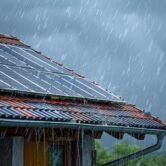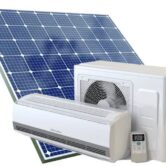In Nigeria, where power outages are frequent and fuel prices are rising, more households are turning to solar energy for reliable electricity. However, many Nigerians still don’t know how solar energy works or what kind of system is right for their homes. If you’re considering solar but don’t know where to start, this guide is for you.
We’ll break down the types of residential solar systems, how to choose the right capacity, and what you need to consider before going solar.
Types of Residential Solar Energy Systems in Nigeria
There are three main types of solar systems you can install in your home:
1. Grid-Tied Solar Syste
- Connected to the national grid (e.g., PHCN/NEPA).
- You use solar power during the day, and switch to the grid when solar is unavailable.
- In countries with stable grids, excess energy can be sold back — but in Nigeria, grid-tied systems are limited due to unreliable power supply and lack of net metering.
- Best for: Homes in cities with relatively stable grid supply.
2. Off-Grid Solar System
- Completely independent from the national grid.
- Requires solar panels + battery storage + inverter.
- Stores excess power during the day for use at night or on cloudy days.
- Best for: Rural areas or locations with little to no grid supply.
3. Hybrid Solar System
- Combines solar energy, batteries, and the grid (or a generator).
- Automatically switches between solar, batteries, and grid power depending on availability.
- Offers flexibility and uninterrupted power.
- Best for: Urban homes that experience frequent outages but still have some access to the grid.
What Capacity of Solar System Do You Need?
The capacity of your solar system depends on your energy consumption. Here’s how to calculate it:
Step 1: List All the Appliances You Use
Make a list of all appliances, how many hours you use them per day, and their power rating (in watts). Common examples:
| Appliance | Power Rating (Watts) | Usage (Hours/Day) | Energy Consumption (Wh/day) |
|---|---|---|---|
| LED Bulb (5 units) | 10W each = 50W | 6 hrs | 300 Wh |
| Ceiling Fan | 70W | 8 hrs | 560 Wh |
| TV | 100W | 5 hrs | 500 Wh |
| Fridge | 150W (avg.) | 24 hrs | 1,200 Wh |
| Phone Charging (x2) | 10W each = 20W | 4 hrs | 80 Wh |
Total: ~2,640 Wh/day (or 2.64 kWh/day)
Step 2: Determine the System Size
Now that you know your daily energy need (e.g., 2.64 kWh), factor in:
- Sunlight Hours in Nigeria: Average of 4–5 hours of effective sunlight per day.
- Energy losses: Account for system inefficiencies (~20%).
Example Calculation:
- Needed output = 2.64 kWh ÷ 4 sun hours = 0.66 kW (660W)
- Adjusting for losses: 0.66 kW × 1.2 = ~800W of solar panel capacity
🔹 You need at least an 800W solar system for this home.
🔹 Battery size: Multiply daily energy need × number of backup days.
- 2.64 kWh × 1 day = 2.64 kWh battery (i.e., 2.64 kWh ÷ 12V = ~220Ah battery at 12V)
Typical Residential Solar System Sizes in Nigeria
| System Size | What It Powers | Suitable For |
|---|---|---|
| 500W – 1kW | Lights, fans, TV, small electronics | Small apartments |
| 1.5kW – 2.5kW | Lights, fans, TV, fridge, laptops | 2–3 bedroom homes |
| 3kW – 5kW | Add pumping machine, microwave, washing machine | Larger homes |
| 5kW+ | Whole house with heavy appliances (ACs, freezers, etc.) | Duplexes, high-energy homes |
Important Considerations Before Installing Solar
- Appliance Efficiency: Use energy-saving devices to reduce overall load.
- Roof Space: Ensure you have enough unshaded roof area for your panels.
- Battery Storage: Decide if you want full autonomy from the grid or just backup.
- Installer Credibility: Work with certified professionals to avoid poor installation.
- Budget: Costs vary based on size, components, and quality — but there are affordable financing options in Nigeria today.
Final Word: Solar is an Investment, Not a Luxury
Solar energy is not just for the wealthy or for businesses — it’s for every Nigerian tired of unreliable power and noisy generators. Whether you live in Lagos, Kaduna, Port Harcourt, or a rural community, solar can provide clean, stable, and cost-effective electricity.
Invest wisely, start small if necessary, and build up your system as your needs grow.





